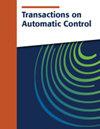多智能体控制时空逻辑规范满意度的量化研究
IF 7
1区 计算机科学
Q1 AUTOMATION & CONTROL SYSTEMS
引用次数: 0
摘要
在本文中,我们研究了必须符合时空逻辑要求的多智能体系统(MASs)的控制综合问题。我们定义了一种称为团队时空到达和逃避逻辑(t-STREL)的逻辑,以及它的鲁棒性度量,它在任何地方都是连续的,几乎在任何地方都是可微的。这些特性有助于使用基于梯度的优化和基于学习的控制技术,与传统的无梯度方法相比,提供更高的效率。我们提出了三种利用这些鲁棒性来控制MAS的方法。第一种方法结合了基于梯度的优化算法和启发式优化算法(混合优化)。第二种方法使用模仿学习从离线优化生成的数据集中学习递归神经网络(RNN)控制器。第三种方法采用基于模型的策略搜索算法,在没有数据集的情况下直接学习RNN控制器。我们在一个模拟示例中展示了我们提出的方法。我们证明,通过混合优化,MAS可以实现符合t-STREL要求的高成功率,而模仿学习方法可以用于实时控制。基于模型的策略搜索方法可以在较短的训练时间内同时实现这两个目标。本文章由计算机程序翻译,如有差异,请以英文原文为准。
Quantifying the Satisfaction of Spatio-Temporal Logic Specifications for Multiagent Control
In this article, we study control synthesis problems for multiagent systems (MASs) that must comply with spatio-temporal logic requirements. We define a logic called team spatio-temporal reach and escape logic (t-STREL) and a robustness metric for it that is continuous everywhere and differentiable almost everywhere. These properties facilitate the use of gradient-based optimization and learning-based control techniques, offering greater efficiency compared to traditional gradient-free methods. We propose three approaches leveraging these robustness properties to control the MAS. The first combines a gradient-based optimization algorithm with a heuristic one (hybrid optimization). The second uses imitation learning to learn a recurrent neural network (RNN) controller from a dataset generated by off-line optimizations. The third approach employs a model-based policy search algorithm to learn an RNN controller directly without a dataset. We showcase our proposed approaches in a simulated example. We demonstrate that, with hybrid optimization, the MAS can achieve a high success rate of compliance with the t-STREL requirement, while the imitation learning approach can be used for real-time control. The model-based policy search approach can concurrently achieve both objectives within a relatively short training time.
求助全文
通过发布文献求助,成功后即可免费获取论文全文。
去求助
来源期刊

IEEE Transactions on Automatic Control
工程技术-工程:电子与电气
CiteScore
11.30
自引率
5.90%
发文量
824
审稿时长
9 months
期刊介绍:
In the IEEE Transactions on Automatic Control, the IEEE Control Systems Society publishes high-quality papers on the theory, design, and applications of control engineering. Two types of contributions are regularly considered:
1) Papers: Presentation of significant research, development, or application of control concepts.
2) Technical Notes and Correspondence: Brief technical notes, comments on published areas or established control topics, corrections to papers and notes published in the Transactions.
In addition, special papers (tutorials, surveys, and perspectives on the theory and applications of control systems topics) are solicited.
 求助内容:
求助内容: 应助结果提醒方式:
应助结果提醒方式:


